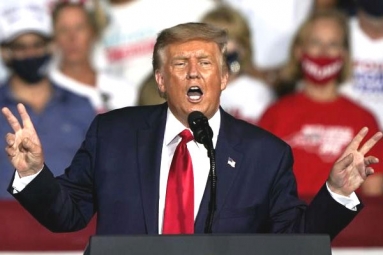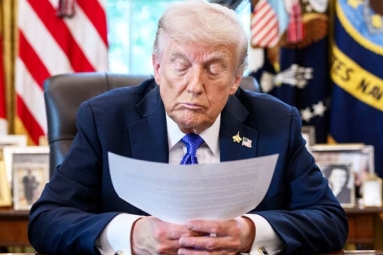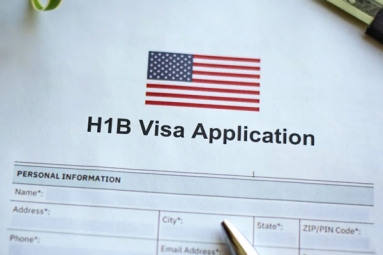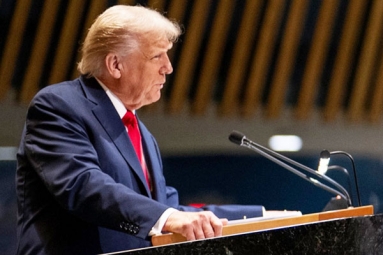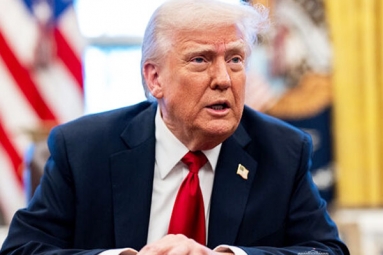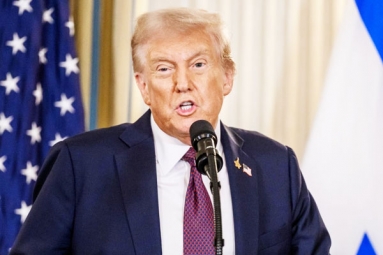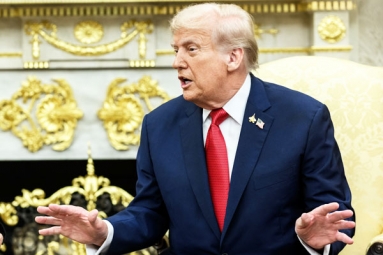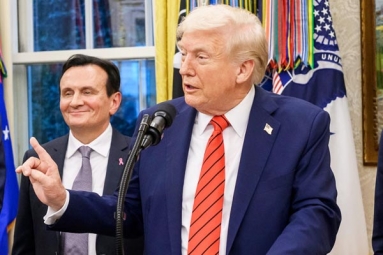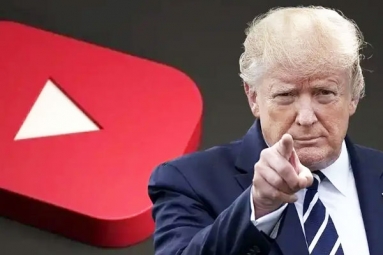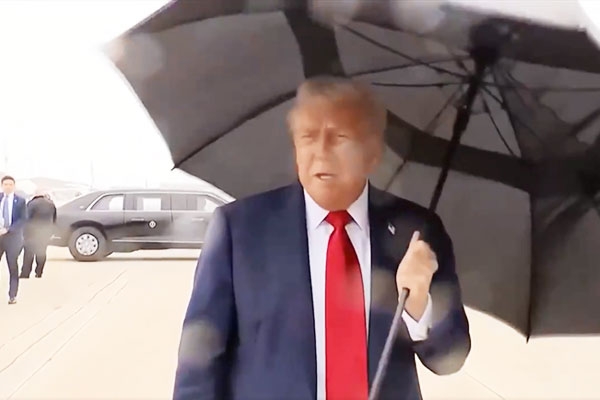
(Image source from: x.com/WhiteHouse)
President Donald Trump departed for Israel and Egypt on Sunday to honor the ceasefire and hostage agreement between the U.S., Israel, and Hamas, encouraging allies in the Middle East to take advantage of this chance to create lasting peace in the turbulent area. This is a delicate situation, as Israel and Hamas are just starting the first phase of Trump's plan aimed at putting an end to the conflict that began with the attack on Israel by Hamas on October 7, 2023. Trump believes there is a short opportunity to change the dynamics in the Middle East and improve the troubled relationships between Israel and its Arab neighbors. “The war is over, alright?” Trump stated to reporters traveling with him, anticipating the upcoming release of hostages from Gaza. “I think people are fed up with it," he noted, stressing that he was confident the ceasefire would last because of this sentiment.
The Republican president asserts that this moment has been aided by his administration's backing of Israel's efforts against Iranian allies, including Hamas in Gaza and Hezbollah in Lebanon. The White House claims that there is growing progress because Arab and Muslim nations are showing a renewed interest in finding a solution to the long-standing Israeli-Palestinian conflict and, in some cases, enhancing their ties with the U.S.
Trump has mentioned his expectation that wealthy countries in the region will take charge in rebuilding Gaza, but he recognized that this work will require many years. In February, Trump had envisioned Gaza becoming what he described as “the Riviera of the Middle East.” However, on Sunday while on Air Force One, he was more cautious. “I’m not sure about the Riviera for some time,” Trump remarked. “It’s destroyed. It looks like a demolition area." Nonetheless, he expressed a desire to visit the area one day. “I’d like to stand on it, at least," he said. The first phase of the ceasefire plan includes the release of the last 48 hostages held by Hamas, about 20 of whom are thought to be alive; the freeing of hundreds of Palestinian prisoners detained by Israel; an increase in humanitarian aid to Gaza; and a partial withdrawal of Israeli troops from Gaza’s major cities.
Israeli forces completed their pullout from some areas of Gaza on Friday, starting a 72-hour timer as part of an agreement for Hamas to free Israeli captives, possibly coinciding with Trump’s visit there. He mentioned that he expects the hostages to be back by Monday or Tuesday. Trump will first go to Israel to meet families of the hostages and speak to the Knesset, Israel’s parliament, an honor last given to President George W. Bush during his trip in 2008. On Sunday, Vice President JD Vance stated that Trump is also anticipated to meet with the recently freed hostages. “We are optimistic about the hostages being set free, and the president is actually heading to the Middle East, probably this evening, to welcome them in person,” Vance told CBS’ “Face the Nation.”
Afterward, Trump will visit Egypt, where he and Egyptian President Abdel-Fattah el-Sissi will host a meeting in Sharm el-Sheikh with leaders from over 20 nations about achieving peace in Gaza and the wider Middle East. The ceasefire is fragile, and it's uncertain if any agreement has been reached about governing Gaza after the conflict, rebuilding the area, and Israel’s request for Hamas to disarm. Discussions about these matters could fail, and Israel has suggested it might initiate military actions again if its conditions aren't fulfilled.
“I believe the likelihood of Hamas disarming is nearly nonexistent,” stated H.R. McMaster, who served as a national security adviser during Trump’s first term, at an event by the Foundation for the Defense of Democracies on Thursday. He predicted that over the next few months, the Israeli military “will need to eliminate them.”
Israel continues to control millions of Palestinians without fundamental rights as settlements grow rapidly in the occupied West Bank. Even though there is increasing acknowledgment of Palestinian statehood, achieving it seems very unlikely due to Israel’s resistance and actions on the ground. The conflict has made Israel feel isolated internationally and facing serious accusations of genocide, which it rejects. There are international arrest warrants against Israeli Prime Minister Benjamin Netanyahu and his former defense minister, and the United Nations’ highest court is looking into genocide claims made by South Africa.
Hamas has faced significant military defeat and has surrendered its key negotiating tool with Israel by letting go of the hostages. However, the militant organization remains functional and might rebuild itself if there is a long period of peace. Netanyahu stated that Israel will keep working on disarming Hamas after the hostages are freed. “Hamas only accepted the agreement when it felt threatened and that threat is still present,” Netanyahu mentioned on Friday as Israel started to withdraw its military forces.
Trump aims to expand the Abraham Accords. A large portion of Gaza is now in ruins, and the approximately 2 million people living there are facing severe hardships. As part of the agreement, Israel has committed to reopening five border crossings, which will assist in bringing food and other necessities into Gaza, where there are areas suffering from famine.
Trump is also establishing a civil-military coordination center in Israel, led by the U.S., to help manage the delivery of humanitarian aid as well as logistical and security support to Gaza. Around 200 American soldiers will assist in monitoring the ceasefire agreement, working alongside partner countries, nonprofits, and businesses. According to Adm. Brad Cooper, the U.S. military leader in the region, troops will not be deployed to Gaza, as he stated in a social media update on Saturday. The White House has indicated that Trump is eager to shift focus back to expanding the Abraham Accords, which created diplomatic and trade relationships between Israel and the UAE, Bahrain, and Morocco.
Reaching a lasting agreement in Gaza could open the way for Trump to start discussions with Saudi Arabia and Indonesia, which has the largest Muslim population, about normalizing relations with Israel, according to a senior official from the Trump administration who spoke to reporters without revealing their name. Securing such an agreement with Saudi Arabia, the most influential and wealthy Arab nation, could transform the region and enhance Israel’s position significantly. However, arranging this kind of deal is challenging, as Saudi Arabia has stated it will not officially recognize Israel until there is a resolution to the Israeli-Palestinian conflict.








